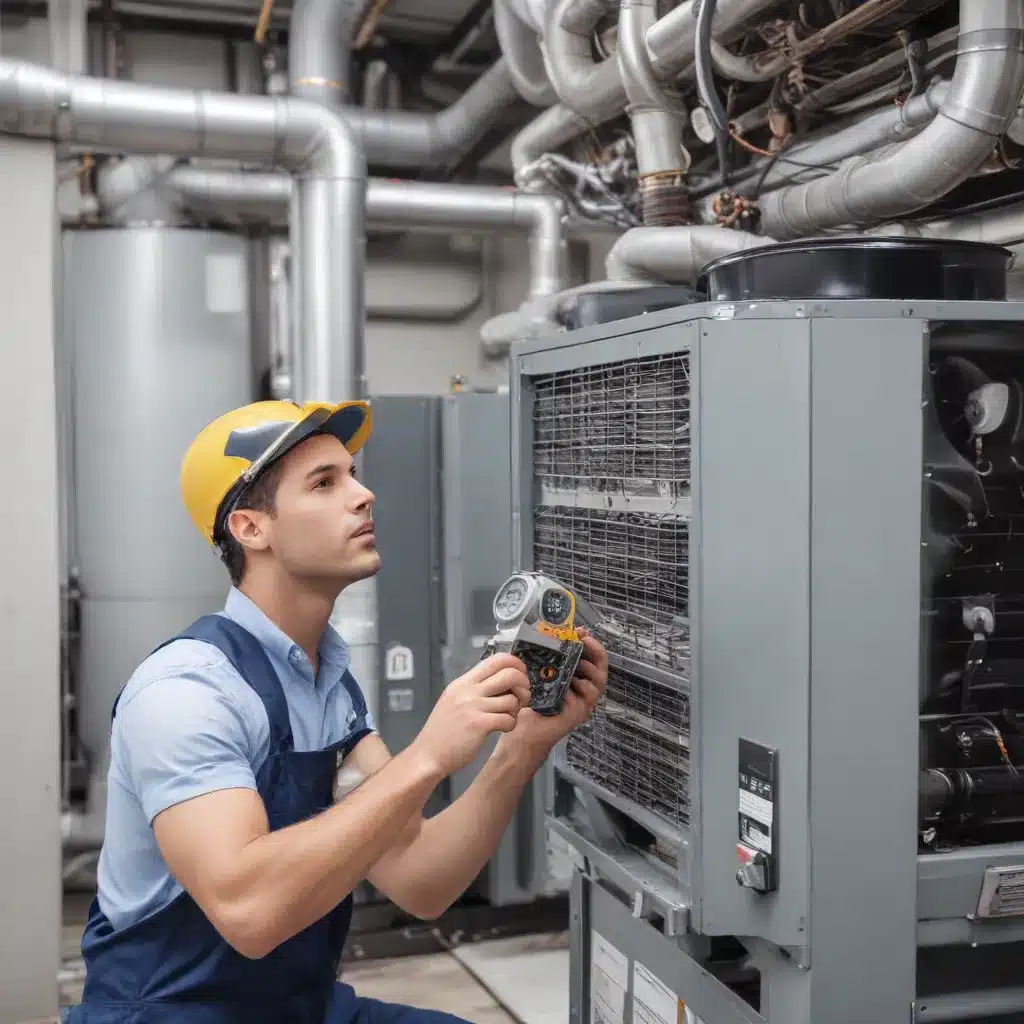
As an experienced air conditioning specialist, I’ve seen firsthand how advancements in HVAC technology have transformed the way we approach system maintenance and energy efficiency. Gone are the days of reactive, one-size-fits-all approaches. Today, we have the power to proactively optimize the performance of our heating, ventilation, and air conditioning systems like never before.
The Limitations of Preventive Maintenance
In the past, preventive maintenance has been the go-to strategy for HVAC systems. While this approach represents an improvement over purely reactive maintenance, it still has its drawbacks. Preventive maintenance often relies on fixed schedules, which can result in unnecessary maintenance or the failure to address emerging issues before they become major problems. This not only wastes time and resources but can also lead to suboptimal system performance and higher energy costs.
Consider this: HVAC systems account for 40-60% of a commercial building’s total energy consumption. When these systems are not operating at peak efficiency, the energy waste can be staggering. Even minor performance deficits can quickly add up, siphoning away precious resources and undermining sustainability efforts.
Embracing Predictive Maintenance
This is where predictive maintenance comes in. By leveraging advanced sensor technologies, machine learning algorithms, and intelligent building management platforms, we can gain unprecedented insights into the real-time performance of HVAC systems. Rather than relying on rigid schedules, predictive maintenance allows us to monitor key indicators, detect anomalies, and forecast potential failures before they occur.
One of the primary benefits of predictive maintenance is its ability to optimize energy efficiency. By continuously monitoring factors like fan speed, damper positions, and outdoor air temperature, we can identify operational issues that contribute to energy waste and address them proactively. This not only reduces energy consumption but also extends the lifespan of HVAC equipment, minimizing the need for costly capital expenditures.
Enhancing Occupant Comfort and Safety
But predictive maintenance isn’t just about energy savings – it’s also about ensuring the health, safety, and comfort of building occupants. By integrating critical air quality data, such as carbon dioxide levels, humidity, and temperature, into our monitoring systems, we can fine-tune the environmental conditions within a building. This allows us to maintain optimal conditions without over-ventilating or starving certain areas, ultimately enhancing the overall occupant experience.
Imagine a scenario where a sensor detects a potential issue with the HVAC system, such as a clogged air filter or a malfunctioning damper. With predictive maintenance, that issue would be identified and addressed before it can impact the building’s occupants. No more complaints about stuffy rooms, inconsistent temperatures, or poor air quality. Instead, we can stay one step ahead, delivering a comfortable and healthy indoor environment.
The Power of Data-Driven Insights
At the heart of predictive maintenance is the ability to leverage data-driven insights. By integrating an industry-leading intelligent building management platform, like Hamilton Air Conditioning‘s onPoint, we can access a wealth of real-time information about our HVAC systems. This platform uses advanced machine learning algorithms to analyze sensor data, detect potential issues, and recommend targeted solutions.
One of the key advantages of onPoint is its ability to filter out false alarms and ensure data integrity. By drawing on historical trends and patterns, the system can distinguish between genuine problems and harmless fluctuations, allowing us to focus our efforts on the most critical areas. This level of precision and reliability is essential for making informed decisions and optimizing HVAC performance.
Transforming Maintenance Strategies
Predictive maintenance fundamentally transforms the way we approach building maintenance. Instead of reacting to problems as they arise or adhering to rigid schedules, we can be proactive and strategic. By monitoring equipment performance and predicting potential failures, we can plan maintenance activities more effectively, reduce downtime, and minimize the impact on building occupants.
Moreover, the cost savings associated with predictive maintenance are significant. By optimizing energy efficiency, extending equipment lifespan, and minimizing maintenance expenses, organizations can realize substantial returns on their investment. It’s a win-win scenario – improved performance, reduced operating costs, and enhanced sustainability.
Embracing the Future of HVAC Management
As we look to the future, the role of predictive maintenance in HVAC systems is only going to become more prominent. With the continued advancement of IoT technologies, cloud-based platforms, and data analytics, the ability to monitor, optimize, and maintain HVAC systems will become increasingly sophisticated.
I envision a future where HVAC systems are truly intelligent, adapting to the changing needs of buildings and their occupants in real-time. Imagine a scenario where your air conditioning system can automatically adjust temperature and airflow based on occupancy patterns, weather conditions, and energy usage trends. This level of automation and optimization not only enhances comfort but also dramatically reduces energy consumption and operating costs.
Conclusion
In an era of growing sustainability concerns and ever-evolving technology, embracing predictive maintenance strategies for HVAC systems is no longer a luxury – it’s a necessity. By harnessing the power of data-driven insights and advanced building management platforms, we can optimize the performance of our heating, ventilation, and air conditioning systems, delivering tangible benefits in terms of energy efficiency, cost savings, and occupant satisfaction.
As an air conditioning specialist, I’m excited to see the continued evolution of this field and the transformative impact it will have on the way we manage our built environments. By staying at the forefront of these advancements and partnering with industry leaders like Hamilton Air Conditioning, we can create a future where our HVAC systems not only keep us comfortable but also contribute to a more sustainable, energy-efficient, and technologically advanced world.